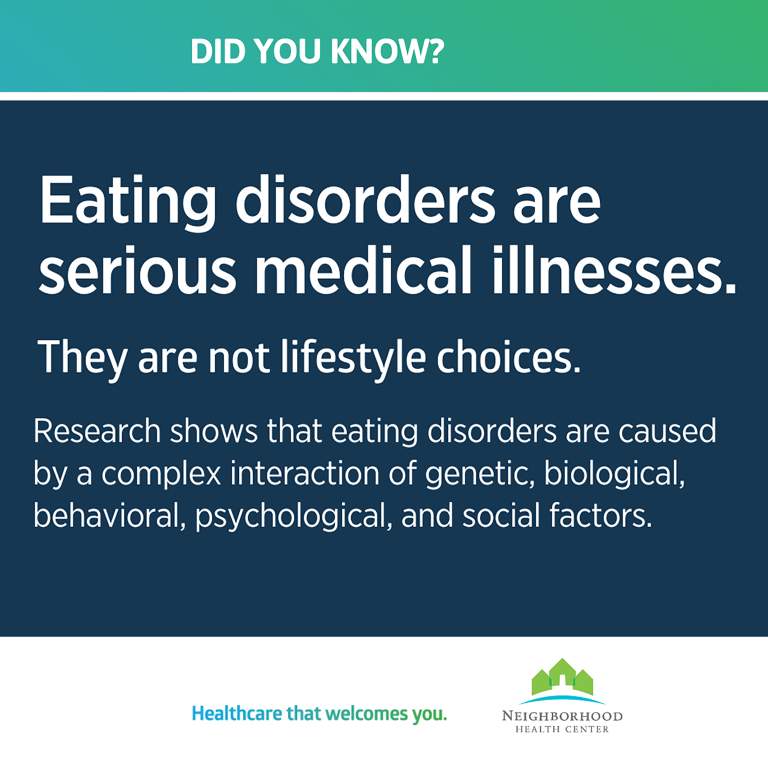
February 27, 2023
Eating Disorder Awareness
The end of February is National Eating Disorder Awareness week, and this week gives Neighborhood a chance to spotlight the seriousness of eating disorders.
Neighborhood Health Center’s behavioral health team works in close coordination with Neighborhood’s nutrition and wellness departments and medical providers to support the needs of patients suffering from eating disorders.
Eating disorders are serious and sometimes fatal illnesses that affect all types of people. Appearance isn’t always a telling sign as people with eating disorders may appear healthy.
“Eating disorders can vary in their course from short-lived to recurrent or they may persist for years if left untreated,” explains Christie Lesser, LCSWR who chairs Neighborhood’s behavioral health department. “Someone who is showing possible signs of anorexia, bulimia, or binge-eating disorder should seek medical help as soon as possible.”
There are multiple eating disorders, however, the most common are anorexia nervosa, bulimia nervosa, and binge-eating.
Anorexia is an extremely unhealthy and sometimes life-threatening way to cope with emotional problems. People living with anorexia may be suffering from low body weight attributed to the intense fear that they are overweight, even though they may be dangerously underweight. These individuals place a high value on their physical appearances such as their weight and shape, using extreme measures and actions to keep their weight and size in control.
People suffering from bulimia may secretly binge by eating large amounts of food with a loss of control over the eating. After eating, people with bulimia will then purge or practice self-induced vomiting or misuse laxatives, weight-loss supplements, diuretics, or enemas to rid themselves of the extra calories and food they consumed. People with bulimia have recurring, frequent episodes of eating unusually large amounts of food and then follow these food binge episodes with unhealthy behaviors to compensate for the overeating.
Binge-eating disorder is a serious eating disorder in which people frequently consume unusually large amounts of food and feel unable to stop eating. Although on occasion, such as having seconds or thirds during a holiday meal, people suffering from binge-eating disorder cannot control excessive overeating and typically feel out of control with their eating habits, making over-eating a regular occurrence. Unlike bulimia, people suffering from binge-eating disorder do not practice self-induced vomiting or purging.
“Eating disorders often co-occur with other mental health disorders, such as anxiety, depression, PTSD, and OCD, as well as a variety of medical diagnoses,” explains Neighborhood's associate behavioral health department chair Megan Robinson, LCSWR. “Treatment for eating disorders involves a collaborative approach between your medical providers, mental health therapist, and nutritional counseling.”
You can learn more about Neighborhood’s behavioral health services by clicking the following link: https://nhcwny.org/services/service:behavioral-health/
Additionally, you can find a screening tool that provides a list of resources, a questionnaire, and online chat support within the following link: https://screening.mhanational.org/screening-tools/eating-disorder/